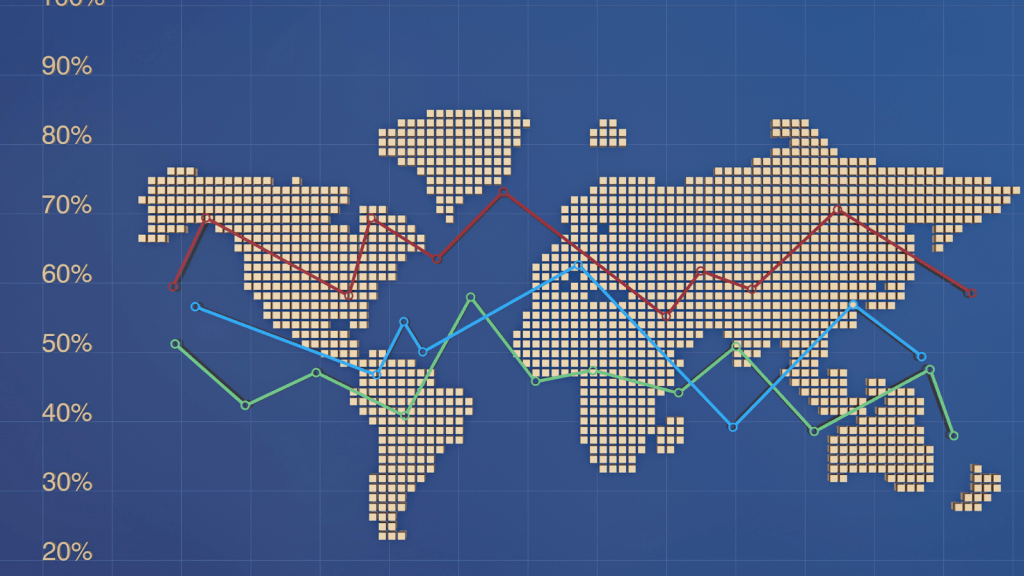The global economy has been swept up in some of the most intense winds of change in history, undergoing a transformation that feels like a birthing pain. The dizzying pace of technological advancement, the radical restructuring of financial systems, major shifts in the energy sector, and geopolitical tensions are emerging as “game changers”. These game changers will profoundly impact not only the present but also the future thanks to their potential to reshape global trade and economic power dynamics.
Catalyst of Digital Transformation: Artificial Intelligence and New Technologies
One of the most powerful game changer of the information age is artificial intelligence (AI). AI based technologies are rewriting the codes of the business world. Innovations such as big data analytics, blockchain technology, and the Internet of Things are fundamentally changing not only the ways of doing business but also the dynamics of the workforce. Companies’ investments in these technologies are already beginning to yield benefits ranging from operational efficiency to competitive advantage. However, this transformation also brings disruptive changes in the labor market; some traditional professions are becoming obsolete while entirely new job fields and specialties are emerging.
Harbingers of a New Financial Order: Cryptocurrencies and Fintech
The financial world is stepping into a new era with the rise of digital currencies and fintech solutions. Cryptocurrencies, by enabling financial transactions independent of central authorities, are fundamentally shaking up traditional financial structures. As of 2023, the global market value of digital currencies has exceeded $2 trillion, and this figure is growing every day, offering clues about the financial system of the future. This transformation is prompting central banks to rethink their monetary policies and traditional banking systems; the rise of central bank digital currencies and the strengthening of the Chinese Yuan (RMB) against the US dollar provide insights into how future currencies might be shaped.
The Energy Revolution: Renewable Resources and Decarbonization
A similar transformation is happening in the energy sector. Renewable energy sources now account for over 30% of global electricity production, with Turkey standing out with a rate exceeding 54% in this field. Advances in energy storage and smart grid technologies are increasingly accelerating this transformation each year. This shift is crucial, as a significant portion of the more than $2.3 trillion in annual global energy investments is directed towards this area by governments, international organizations, and banks. However, it is important to remember that fossil fuels still make up 82% of the world’s total energy, which remains one of the biggest obstacles to the transformation process. Green financing tools and environmental, social, and governance (ESG) issues are emerging as decisive factors in investment decisions. This is causing profound changes across many sectors, from energy to agriculture, construction to transportation.
The Rise of Asia: A New Global Power Center
The rise of Asia at the center of the global economy is drawing significant attention. China and India are now not only massive economies but also central to global trade and investment networks, altering the balance of economic power. China’s “Belt and Road” initiative is reshaping global trade routes, while India’s integration into the global economy through its technology and service sectors continues unabated. The rise of these countries is disrupting not only economic but also geopolitical balances.
Geopolitical Risks: Economic Balances in the Shadow of Uncertainties
The possibility of a third world war is being discussed more frequently; the thesis of a clash of civilizations is back on the agenda. Particularly the large-scale geopolitical shifts between the U.S. and China are reverberating deeply in the business world. The rivalry between these two superpowers is shaping not only global trade and financial systems but also international cooperation and diplomatic relations. There is increasing pressure on many critical supply chain companies to move out of China, while developments such as the tightening of sanctions against Russia, Iran, and Venezuela remain on the agenda. Power shifts between global superpowers and regional conflicts are threatening global trade routes and supply chains. This creates uncertainty for international companies and investors while also reshaping the economic order of the future. Trade, technology, currency, and energy wars, Russia’s invasion of Ukraine, and instability in the Middle East are threatening global trade routes and supply chains. These geopolitical risks are making the global economy more fragile than ever before.
To conclude… As the global economy is reshaped by entirely new major changes, not only states but also global and local companies are being swept up in these winds of change. Companies and governments must develop flexible and resilient strategies to counter these uncertainties. The likelihood of these risks are increasing and deeply shaking economic balances. In this context, companies must not only anticipate the future but also act proactively with agile, innovative, and proactive strategies to navigate these complex global dynamics. Otherwise, while some companies will disappear from the market, entirely new players will take the stage. Rest assured: these strategies will not only provide companies (and states) with a competitive advantage but also secure long-term sustainability.

Mehmet Öğütçü
Chairman, Global Resources Partners, UK, and The London Energy Club. Former diplomat, prime minister adviser, IEA and OECD senior executive, director and independent board member at British Gas, Genel Energy, Invensys, Şişecam, Yaşar Holding companies. Chairman of the Middle East Institute, Washington DC, Advisory Board. He can be contacted at [email protected]
To cite this work: Mehmet Öğütçü, “New Game Changers in the Global Economy: Impacts on the Business World”, Panorama, Online, 13 October 2024.https://www.uikpanorama.com/blog/2024/10/13/global-economy-mo/
Copyright@UIKPanorama All on-line and print rights reserved. Opinions expressed in works published by the Panorama belongs to the authors alone unless otherwise stated, and do not imply endorsement by the IRCT, Global Academy, or the Editors/Editorial Board of Panorama.



